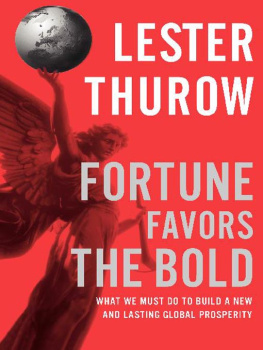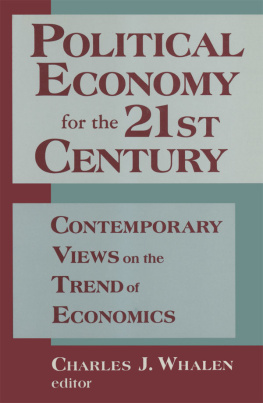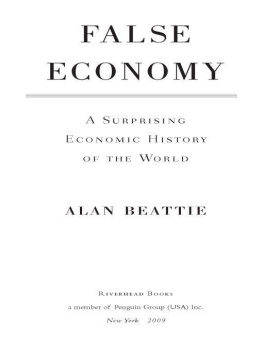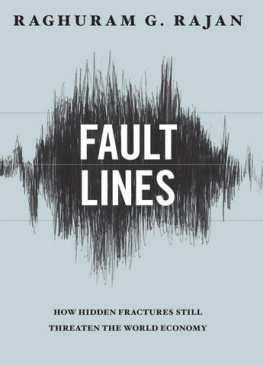A Global Economic
Tower of Babel
G lobalization is much like the biblical Tower of Babel. The construction of a global economy has begun. Some are for it! Some are against it. Neither group knows exactly what it is.
This economic Tower of Babel is being built without a set of construction plans. The necessary architectural drawings arent even in the process of being drafted. Governments arent thinking about the appropriate designs, since the tower is being privately built. National governments would, in fact, rather not think about globalization because it diminishes their role and their powers to control economic events. The actual builders, private firms that are moving their economic activities around the world, dont think about the design and construction of the global economy since each is small relative to what is being built. For those who are true believers in the efficiency of private markets, there is no need to think about the institutions and rules of globalization. Whatever is necessary will simply evolve in the marketplace without private thought or government action. Markets will automatically set the necessary construction standards!
As in the biblical Tower of Babel those involved in constructing the global economy are speaking many different languages. Globalization means many different things to many different people. Arguments for and against it are often self-contradictory. Perhaps these different languages and the associated disputes will stop a global economy from being builtjust as they stopped the biblical tower design to go to heaven from being built. If so, is that a good thing or a bad thing? Have we prevented ourselves from getting to an economic heaven? Or have we prevented ourselves from over-reaching, trying to play God, and ending up in what will surely be an economic hell?
Anxieties are high. The violent antiglobalization demonstrations that have occurred at both public (WTO, IMF, World Bank, Seattle, Goteborg, Bologna) and private (Davos) global meetings in the last few years have delivered that message. Although the number of actual demonstrators is few, I suspect that if every newspaper in the world tomorrow were to have the headline Globalization Ends, far more than half of humanity would feel relieved. In global public opinion surveys less than 20 percent of the population thinks the world is doing well.
What do the protestors dislike? What would they like to see happen? Beneath the noise and babble what is their real message? What are they trying to tell us about globalization? They predict disaster! But which of the predicted disasters are possible and which are impossible? For those that are possible, what are the real causes?
Real disasters are almost never caused by a single factor alone. Investigators start with a jumble of possible causes that have to be sorted out to find the sequence of individual causes that together produced a particular disaster. The same procedure has to be followed when trying to understand the predictions of disaster by those who are against globalization. The nature of the predicted disasters and their potential causes are all jumbled together. They have to be sorted out.
In the conflicting babble generated by the construction of our global economic tower, the problem is to distinguish noise from informationtruth from fiction. The investigator begins by trying to separate out what is true and false in the different arguments. Only when truth has been separated from fiction is it possible to add up the pluses and the minuses to determine whether we should accept or reject globalization.
But there is a third choice. The third choice is to build a global economy that eliminates some of the minuses that have been found. Even if the initial summation indicates the benefits far exceed the minuses, the minuses can be further reduced. The global economy will partially evolve in response to foreseen and unforeseen uncontrollable forces, but in the end it is a human, not geological, construction and can be built to different specifications. Globalization can be shaped.
But to do so it is necessary to understand the dynamics of globalization so the forces of globalization can be used to change the course of globalization. There are actions to be taken that can enhance the positive effects of globalization and minimize its negative effects. These possibilities are outlined and discussed near the end of the book, since an in-depth understanding of the full range of the forces of globalization is necessary to evaluate the various possibilities. What seem like disconnected problems are often connected problems.
In separating the facts from the fiction in all the babble about globalization, it is important to understand that the economic Tower of Babel looks different depending upon where you stand. The rich and successful at the top of the tower see something quite different than do the poor just starting to climb the stairs at the bottom. Those standing far away, outside of the global economy, see a tower with very different contours than what are seen by those working inside the tower. Not surprisingly, the economically, militarily, and politically large and powerful fear the construction of the tower much less than do those who are small and weak.
It is not that one of these perspectives is right and the others are wrong. Each focuses on different elements of the tower. All reflect some aspects of the truth. No one can have all these perspectives simultaneously because no one can see the entire tower or the entire truth. That is why those who are rich and successful, large and powerful, and inside the building of the tower have to listen to the views of those who are poor, unsuccessful, small, powerless, and outside of the global economy. The first group cannot see what the second group sees, but the first group can listen to what the second group has to say.
This warning applies to no one more than Americansthe richest, most successful, largest, and most powerful players and the ultimate insiders in the construction of the global economy. In terms of military and economic power no nation has ever loomed larger in human history. Imperial Rome dominated a large region around the Mediterranean Sea. America dominates the globe. American views will be central in the shaping of globalization, but the structure of globalization is also one of the factors that will limit the arbitrary use of Americas enormous power vis--vis the rest of the world. An America playing in a global economy is very different and much better from the perspective of the rest of the world than an America engaging in a contest for one-country bilateral national economic dominance. An America trading with the rest of the world, investing in the rest of the world, transferring technology to the rest of the world, and educating many from the rest of the world is far better for both those inside and outside of America than is an America that retreats into its traditional isolation.
This imbalance of economic and military power between the United States and the rest of the world has arisen because of decisions made in Japan and Europe. and the economic resources large enough to create a modern military force equal to that of the United States. Yet with the end of the Cold War and any immediate military threat to itself, it has decided not to spend its economic resources on military activities. It is inwardly focused on the peaceful effort of building an integrated Europe. Large military budgets are seen as irrelevant to the success or failure of European integration because if there are military problems in Yugoslavia, the United States will be there. What happens in North Korea is of little interest to Europe and there is no willingness to be engaged in dealing with North Korea, since Europe is confident that America will keep such dangers under control and out of its neighborhood. America outspends the rest of NATO militarily by more than a 2 to 1 ratio. What looks sensible if one is heavily armed looks very different if one is only lightly armed.








